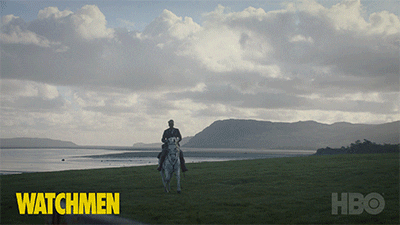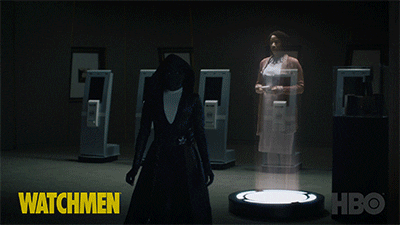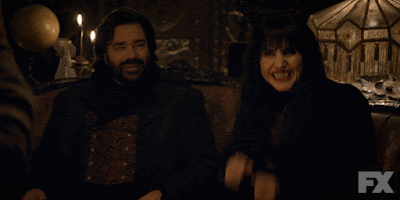Right, you can stop the pandemic now. I’m not playing anymore. Granted, I’ve only got prosecco problems when
it comes to coping with covvers (the mask makes my beard itch, I want to go to
the theatre, I could lose my job etc), but as a lifestyle trend it would be
really great if we could move on to something new. Such is the extent of my fatigue that I
actively avoid almost all news, as it’s mostly just white male Etonians blustering
about the perils of young people and other such evils. But, my clicks were recently baited by
reports of the Emmy
Awards. Sure, there was no ceremony,
but this was a normal annual thing that was almost happening. I’ve harped on here about incredible pieces
of TV that have kept me glued to my sofa and, of course, there were those top
shows among the nominees – you know, your Euphorias
and your Successions. However, among the winning boxsets I was
proud of completing, there was one that had passed me by: Watchmen.
I got the first episode cued up, but it wasn’t until a Friday evening when I was taken by the mood to delve into the story. We all know I’ve no time for superheroes. I’ve even been underwhelmed by attempts to subvert the genre (The Boys). Nevertheless, I had thoroughly enjoyed the film version of Watchmen when it came out in 2009. Oddly plausible, artfully stylised and with a story I can no longer really recall (which wasn’t helped by a second viewing that I mostly slept through), the film gave me an underlying confidence that I wouldn’t be subjecting myself to mindless Marvel’s punching by numbers. This would be something better. And how right was I? And the Emmys? And also all the people that watched it when it came out last year and told me then that it was worth a watch? My whole subsequent weekend was consumed by a need to finish the nine episodes, desperate as I was to solve the mounting mysteries and witness the conclusion of the very complicated plot (unlike the last episode of Dark that I am too scared to watch).
We’ll run through now how watching Watchmen checks off a lot of my boxes when it comes to a good, er, boxset. First up, we’ve got the alternative reality, last seen blowing my mind in the third series of The Handmaid’s Tale. In Watchmen, the Vietnam War has gone a bit differently, cars no longer use petrol, interdimensional squids are an ongoing hazard and, in Tulsa, the police are required to wear masks. If you’re finding this disorientating, then I’ve come some way to approximating the experience of watching the first episode. Initially, Watchmen doesn’t care if you’re clued up on what’s happening or not. Somehow, I was thrilled by my own stupidity and electrified by the need to keep up. Filling the gaps became a desperate urge, mostly because these important elements of context were only ever alluded to in passing, thus making the later expositions all the more plausible. I was completely sold.
One alternate the Watchmen reality keeps the same is racial tension. A prominent catalyst to the show’s events is the Tulsa race massacre, something which, to my shame, I had never heard of. If Watchmen’s only achievement in this world is to make more people aware of the 1921 destruction of a prosperous Black neighbourhood by white supremacists, then for that alone I would doff my hat to it. Throughout the present-day narrative, the threat of racists remains and looms large. It’s given an all-the-more-terrifying edge by the way these thugs mask their beliefs with respectability, making us blind to their blind hatred, while they are deaf to reason. I won’t reduce racial tension to a plot device – Watchmen unapologetically puts America’s issues with race front and centre – but it brings to life a good-versus-evil jeopardy that means so much more than generic white man hero battling generic supervillain. And on that note, Watchmen revels in its championing of actors that are normally side-lined. Reams and reams of glorious dialogue proceed without a white man in sight.
My final point to stress is Watchmen’s deft stretching of narrative tension so that each episode thwarts as much as it solves, carefully creating the coming crescendo which forms the mini-series’ climax. Once enough intrigue is set up, the revelations come thick and fast. Regina King is our (badass) anchor as we navigate each blow to the psyche, and don’t worry if you at first think that Yahya Abdul-Mateen II doesn’t have enough to do (see The Get Down and Black Mirror for evidence of his range), but around this central couple assembles an array of characters you can’t help but feel desperate to know more about. I craved more of Jean Smart’s Agent Blake while Hong Chau’s Lady Trieu maintained the perfect level of moral ambiguity until just the right moment. I won’t spoil things by saying one or two minutes of the finale got just a touch too Marvel-y for me as everything else was a sublime televisual experience.
If we end up confined to our homes again, then Watchmen is
the closest you can get to the visceral real-life experiences we have been
lacking in 2020. Maybe we do need heroes
after all, but Watchmen’s heroes aren’t preening about in Spandex demanding
attention for selective philanthropy.
Instead, they’re driven by their own hatred of systems and belief
structures that hold humankind back.
They’re compelled to act against what is wrong, no matter the cost, and
this is quite rightly what Watchmen presents as heroism. Anyway, we seem to have strayed into some
very uncharacteristically earnest territory for Just One More Episode, especially
when we’re all here for passive aggression and sarcasm. But what can I say? Here is a boxset that transcends all the blue
willy comments it’s left itself open to.
If only all storytelling could be this good, and this important.
































